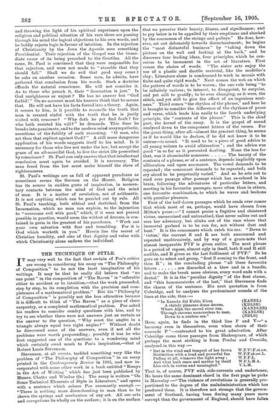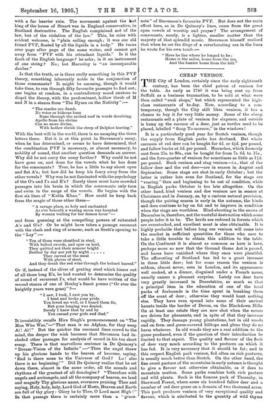I T may very well be the fact that certain of
Poe' s critics are wrong in considering his essay on " The Philosophy of Composition" to be not the least imaginative of his writings. It may be that he really did believe that " no one point " in the composition of " The Raven " is " referable either to accident or to intuition,—that the work proceeded, step by step, to its completion with the precision and com- pleteness of a mathematical problem." But his " Philosophy of Composition " is possibly not the less attractive because it is difficult to think of " The Raven " as a piece of sheer carpentry, or a completed mathematical problem. Poe asked his readers to consider sundry questions with him, and to try to see whether there were not answers just as certain as the answer to the question, " Why must the angles in a triangle always equal two right angles ? " Without doubt he discovered some of the answers, even if not all the problems were worth propounding ; possibly it was he who first suggested one of the questions to a wondering mind which certainly owed much to Poe's inspiration,—that of Robert Louis Stevenson.
Stevenson, at all events, tackled something very like the problem of "The Philosophy of Composition" in an essay printed in the Contemporary Review in 1885, and now in- corporated with some other work in a book entitled "Essays in the Art of Writing " which has just been published by Messrs. Ghetto and Windus (0.) The essay is written " On Some Technical Elements of Style in Literature," and opens with a sentence which echoes Poe resonantly enough :— " There is nothing more disenchanting to man than to be clown the springs and mechanism of any art. All our arts and occupations lie wholly on the surface ; it is on the surface that we perceive their beauty, fitness, and significance; and to pry below is to be appalled by their emptiness and shocked by the coarseness of the strings and pulleys." He does, how- ever, set out debonairly towards disenchantment; he begins the "most distasteful business" by "taking down the picture on the wall and looking at the back," and be discovers four leading ideas, four principles, which he con- ceives to be immanent in the art of literature. First comes the choice of words. " The sister arts enjoy the use of a plastic and ductile material, like the modeller's clay; Literature alone is condemned to work in mosaic with finite and quite rigid words." Next comes the web on which the pattern of words is to be woven ; the one rule being "to be infinitely various ; to interest, to disappoint, to surprise, and yet still to gratify; to be ever changing, as it were, the stitch, and yet still to give the effect of an ingenious neat- ness." Third comes "the rhythm of the phrase," and here he is brought to consider the difference of the rhythms of prose and verse, which leads him easily to the fourth underlying principle, the "contents of the phrase." This is the chief part, the kernel of the, essay. It is the gospel of sound analysed down to the component letters of the verses. For the great thing, after all—almost the greatest thing, be seems as if he would like to declare, if he did not know it to be untrue—is sound. "It used to be a piece of good advice to all young writers to avoid alliteration "; and the advice was good "in so far as it prevented daubing None the less for that, was it abominable nonsense The beauty of the contents of a phrase, or of a sentence, depends implicitly upon alliteration and upon assonance. The vowel demands to be repeated ; the consonant demands to be repeated ; and both cry aloud to be perpetually varied." And so he sets out to read over passage after passage which has re-echoed in his brain, following the adventures of particular letters, and meeting in his favourite passages, more often than in others, one favourite combination, to which he waves and beckons with peculiar pleasure.
First of the half-dozen passages which he reads over comes
that which most of us, perhaps, would have chosen from Milton's prose :—" I cannot praise a fugitive and cloistered virtue, unexercised and unbreathed, that never sallies out and sees her adversary, but slinks out of the race where that immortal garland is to be run for, not without dust and heat." It is the consonants which catch his ear. "Down to virtue,' the current S and R are both announced and
repeated unobtrusively, and by way of a grace-note that almost inseparable PVF is given entire. The next phrase is a period of repose, almost ugly in itself, both S and It still audible, and B given as the last fulfilment of PVF." So he goes on to select and group, " first S coming to the front, and then It" ; in the concluding phrase " all these favourite
letters are discarded at a blow and in a bundle, and to make the break more obvious, every word ends with a dental." It is in the "peculiar dignity" of the first clause, and "this hammerstroke of the last," that Stevenson finds the charm of the sentence. His next quotation is from Coleridge, and he analyses the predominant sounds of the lines at the side, thus
:-
"In Xanadu did Kubla Khan (KANDL) A stately pleasure dome decree, (KDLSR) Where Mph the sacred river ran, (KANDLSR) Through caverns measureless to man, (KANLSR) Down to a sunless sea." (NDLS)
Here, again, he finds in the third line F and V—" a harmony even in themselves, even when shorn of their comrade P "—contrasted to his great admiration. After Coleridge come three passages from Shakespeare, of which perhaps the most striking is from Troilus and Cressida, analysed in this way :- " But in the wind and tempest of her frown W.P.V2.F.st.ow.
Distinction with a loud and powerful fan W.P.F.st.ow.L.
Puffing at all, winnows the light away ; W.P.F.L.
And what hath mass and matter by itself W.F.L.K.A. Lies rich in virtue and unmingled."
That is, of course, PVF with side-currents and undertones.
He hears the same dominant chord in the first page he picks in Macaulay :—" The violence of revolutions is generally pro- portioned to the degree of the maladministration which has produced them. It is therefore not strange that the govern- ment of Scotland, having been during many years more corrupt than the government of England, should have fallen Scotland destructive. The English complained not of the law, but of the violation of the law." This, he cries with evident welcome, is " plain sailing enough ; it was our old friend PVF, floated by all the liquids in a body." He turns over• page after page of the same writer, and cannot get away from "PVF with his attendant liquids." Is it the fault of the English language ? he asks ; is it an instrument of one string ? No ; but Macaulay is " an incomparable dauber."
Is that the truth, or is there really something in this PVF theory, something inherently noble in the conjunction of those consonants P It might be amusing, though it would take time, to run through fifty favourite passages to find out; one begins at random, in a contradictory mood anxious to dispel the theory, with the predominant, hollow throb of M and N in a stanza from "The Hymn on the Nativity ":—
" The oracles are dumb.
No voice or hideous hum Runs through the arched roof in words deceiving.
Apollo from his shrine Can no more divine, With hollow shriek the steep of Delphos leaving."
With the best will in the world, there is no escaping the three letters there. But it is at this point in Stevenson's essay, when he has determined, or seems to have determined, that the combination PVF is necessary, or almost necessary, to nobility of sound, that another question demands an answer.
Why did he not carry the essay further ? Why could he not have gone on, and done for the vowels what he has done for the consonants ? True, he has a little to say about open and flat A's ; but how did he keep his fancy away from the other vowels ? Why was he not fascinated with the psychology of the O's and I's and E's ? Surely there must have crowded passages into his brain in which the consonants only turn and swim in the surge of the vowels. He begins with the first six lines of " Ruble. Khan." How could he keep back from the magic of those other three-
" A savage place, as holy and enchanted As e'er beneath a waning moon was haunted By woman wailing for her demon lover"— and from guessing at the compelling powers of reiterated A's and O's? Or he might have taken a passage resonant with the clash and ring of armour, such as Scott's opening to the "Lay":— "Ten of them were sheathed in steel, With belted swords, and spur on heel, They quitted not their armour bright
Neither by day nor yet by night They carved at the meal With gloves of steel, And they drank the red wine through the helmet barred."
Or if, instead of the sliver of grating steel which hisses out of all those long E's, he had wanted to determine the quality of sound of recurrent I's, what would he have written of the second stanza of one of Henley's finest poems (" Or ever the knightly years were gone)"
" I saw, I took, I cast you by,
I bent and broke your pride.
You loved me well, or I heard them lie, But your longing was denied. Surely I knew that by and by You cursed your gods and died."
It irresistibly recalls Hira Singh's pronouncement on " The Man Who Was,"—" That man is no Afghan, for they weep Ai ! Al!" But the quicker the resonant lines crowd to the mind, the deeper the wish becomes that Stevenson had in- cluded other passages for analysis of sound in his too short essay. There is that marvellous sentence in De Quincey's "Dream-Vision of the Infinite" :—" Then the angel threw up his glorious hands to the heaven of heavens, saying, `End is there none to the Universe of God ? Lo ! also there is no beginning." Did De Quincey realise that he set down there, almost in the same order, all the sounds and rhythms of the greatest of all doxologies ? "Therefore with angels and archangels, and all the company of heaven, we laud and magnify Thy glorious name, evermore praising Thee and saying, Holy, holy, holy, Lord God of Hosts, Heaven and Earth are full of thy glory : Glory be to Thee, 0 Lord most High !" In that passage there is certainly more than a "grace-
open vowels of worship and prayer ? The arrangement of consonants, surely, is a lighter, smaller matter than the majesty of that splendid music. Stevenson himself realised that when he set the dirge of a reverberating sea in the lines he wrote for his own tomb :-
" Here he lies where he longed to be ;
Home is the sailor, home from the sea, And the hunter home from the hill."
CHEAP VENISON.











































 Previous page
Previous page